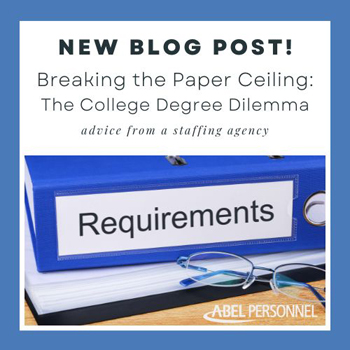The hiring manager was especially impressed by three of the candidates that his Abel Personnel recruiter had offered to him. Within just a few days of issuing the job order, he had received several resumes. From these he had selected five to interview over the next three days. Of the top three, each candidate was a very good fit, and each had some strengths that others lacked. Jenn was clearly the strongest candidate, having the most experience in the open position for similar companies before recently relocating to the Harrisburg area. The hiring manager anticipated that Jenn would bring along some best practices that would make his company more efficient and state-of-the-industry in its processes.
“The biggest concern, of course, is that Jenn does not have a college degree, while the other two candidates have college degrees” the manager explained to the recruiter.
“Ah, the paper ceiling!” the recruiter responded.
The STARs
From the manager’s inquisitive look, the recruiter gathered that the manager was unfamiliar with that term. She then explained that the “paper” referred to was the degree that half of all members of the workforce lacked. Despite having good skills and experience, this missing qualification was stalling their careers, and preventing prospective employers from benefiting from their talent. She then identified some of those types of candidates that had skills and experience but were overlooked for the absence of a degree:
- Military Service Veterans
- Community College Students
- Workforce Training Participants
- Certificate Programs Students
- On-the-job Learning employees
- Employees who immediately entered the workforce on high school
These workers are referred to as STARs (Skilled Through Alternate Routes). There are currently 70 million of them in the U.S. Not having a college degree also subjects them to exclusion from alumni networks, to degree screens and algorithm biases, and to false stereotypes and misperceptions. This qualification omission is too often assumed to mean “low skilled” when appraising job candidates of color.
Contribution-Based Hiring Decisions
The current labor shortage is prompting companies to certainly consider alternative types of candidates for job openings. However, there is also a reevaluation underway of the true importance of a degree.
Pennsylvania is among several states that recently eliminated a four year degree requirement for most state jobs (92% or 65,000 jobs). The state will be reviewing skills and experience to qualify candidates for open positions. Other states that have gone this route include Maryland, Colorado and Utah. Alaska and Georgia are examining this approach as well.
There is a vision to transform the U.S. to have a labor market where “if you can do the job, you can get the job.” This may be a relief to those being routed by their guidance counselors and parents to higher education immediately after high school in order to achieve the highest earning potential. Some of the recent grads may not yet be ready or might never be right to go to college to obtain the skills they need to succeed in their callings. A college degree still is essential for many professions and can result in a well rounded future worker. As one organization quipped, “College is a wonderful bridge to opportunity for millions, but it should never be a drawbridge excluding anyone who doesn’t cross it from (having) thriving careers.”
The Abel recruiter commented that the value of a college degree should not be discounted. It takes hard work, persistence and dedication to complete a college education. In addition, the college experience is broadening, exposing students to varied subjects, ideas, and challenging their critical thinking. “I often find that the college degree assumes greater importance when comparing job candidates with limited experience. Once a person has a strong track record of employment for ten years, the work experience assumes greater significance.”
The manager then reflected on his own biases in the hiring process. It was easier to pick a candidate based on a checklist of qualifications and experience in an effort to be objective and complete the hire quickly. Much harder to look at the whole person, and to envision how she would add to the capacity of the company and ultimately strengthen the bottom line. That took both insight and caring, as the Abel recruiter had already demonstrated by the caliber of the candidates she had presented. Finally, he recalled many instances in his career that a very bright and capable person, who in high school would be labeled “college-bound,” through the misfortune of circumstances did not have the opportunity to complete a college degree.
“Jenn is the one we want to hire,” he told the recruiter. “My colleagues may be at first resistant due to their cultural prejudices, but I know I can make the case based on her demonstrated ability to do this work and all that I am confident she will bring to our company.”
It was then that the recruiter revealed that Jenn really wanted this job, too. She was eager to give her two week notice, and then would be ready to start immediately thereafter.
Sourced from:
- Opportunity @ Work, “Tear the Paper Ceiling.”
- PA Press Release: Governor Shapiro leads the nation on eliminating college degree requirements expanding job opportunities



